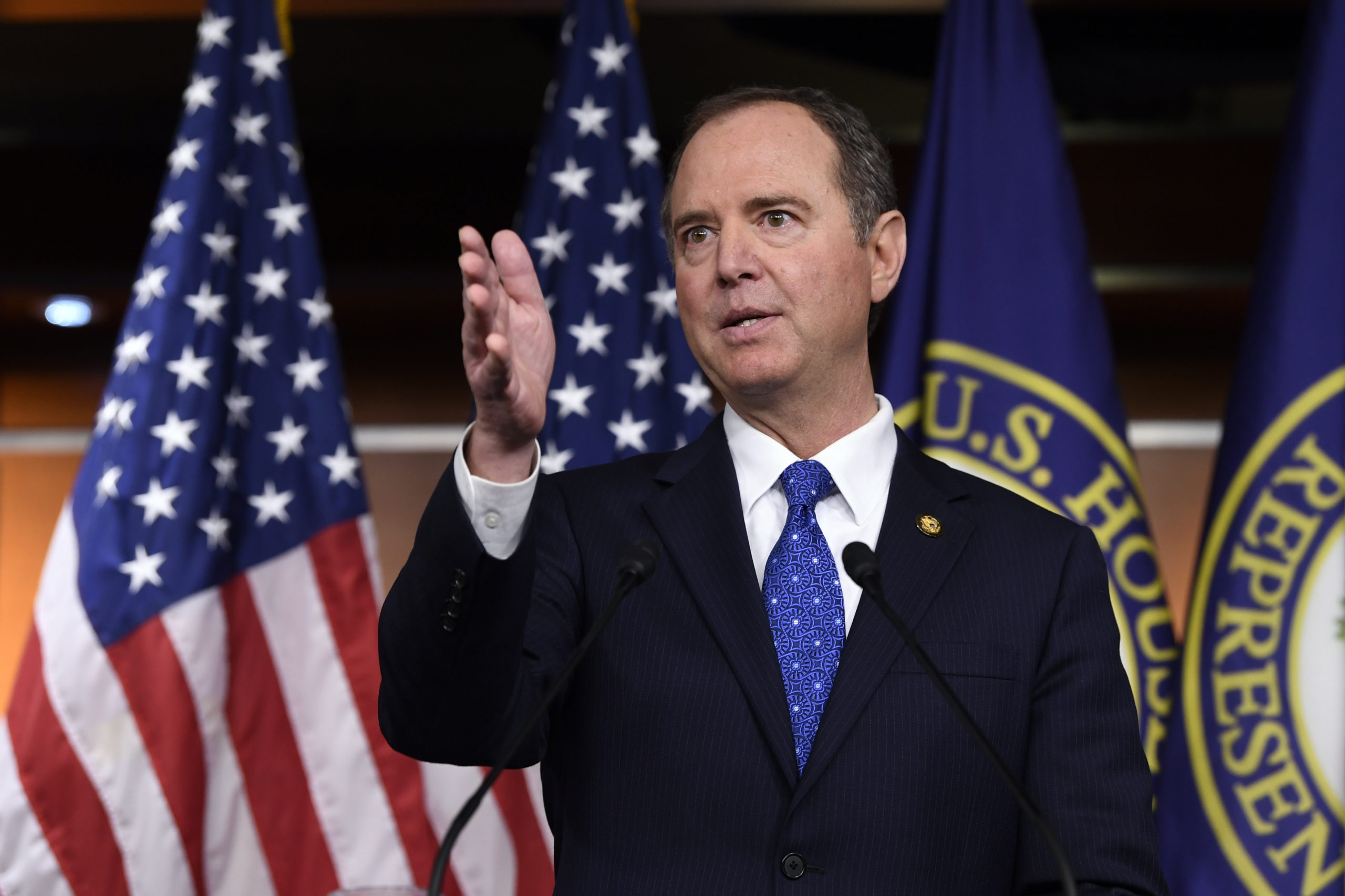Are Democrats Blowing Trump’s Impeachment?
Between their empty patriotism theater and dubious politics, Nancy Pelosi's fast-forwarded proceedings have been painful to watch. House Intelligence Committee Chairman Adam Schiff, D-Calif. (Susan Walsh / AP)
House Intelligence Committee Chairman Adam Schiff, D-Calif. (Susan Walsh / AP)
 This article originally appeared on Salon.
This article originally appeared on Salon.
Thursday’s announcement by House Speaker Nancy Pelosi that Democrats are ready to vote articles of impeachment against President Trump — presumably on the narrowest possible terms, after a constrained and foreshortened process — is hardly surprising. It is, however, disheartening. Why they would even consider moving to a floor vote on impeachment without doing whatever is necessary to compel testimony from John Bolton, who is now a private citizen and has always been a blast-hardened neocon Republican, and who is clearly eager to roast Donald Trump’s gizzard on a fork and then eat it, is profoundly baffling.
Or maybe, sadly, it isn’t. So far, this spectacle confirms my sense that the Democratic Party is strikingly ill-prepared for the historical role it ought to play in this moment of small-d democratic crisis. Driven as usual by fear, excessive caution and a morbid fascination with identifying the middle of the middle of the political middle (and then veering slightly to its right), the Democrats are entirely likely to screw things up, whether morally or tactically or politically or all at once. (See also David Masciotra’s excellent Salon essay last weekend.)
Actually, the Democrats have already screwed it up. Let’s be clear that the Republican defense of Trump is completely incoherent, because there is no defense for his actions. But on a generic or abstract level, Republicans have floated halfway-valid concerns about the process of the impeachment inquiry and the motivations behind it — which Democrats have done little to dispel.
Republicans claim that Democrats have been itching for a pretext to impeach Trump since before he took office, and finally landed on one. That’s at least partly true, although the Angry White People Party is too consumed by paranoid delusions to understand the ways in which it is both true and untrue, and how those reflect the deep and wide schism within the Democrats over how to respond to the Trump era. Sure, Rashida Tlaib got elected in Detroit vowing to “impeach the motherf***er,” but a whole lot of other Democrats got elected while not talking about that at all, and explicitly or otherwise espousing the “back to normal” politics that have made Joe Biden the 2020 frontrunner all year long.
In case you haven’t been keeping score, there is no “normal” to go back to, history never flows backward and that whole approach is a dangerous delusion, as we will all learn the hard way soon enough. Biden would be a disastrous nominee and a terrible president, which is not to say there’s an obvious alternative who inspires immense confidence. But for our present purposes all that is a side issue, even if it’s also a yawning abyss beneath our feet.
Speaking of delusions, Republicans’ elaborate conspiracy theories about how Ukraine and the Democrats (with the help of the CIA and FBI) faked the Russian hack of the DNC in order to launch an investigation of the Trump campaign add up to something like a masterful work of literary parody, out of an unwritten Don DeLillo or Colson Whitehead novel. It’s complete nonsense, of course, but it’s admirably creative nonsense, and you might say it gestures at something real, which is that the “Ukraine scandal” refers to deeply buried issues in U.S. foreign policy that are virtually never discussed in public.
Why exactly is the United States so deeply entangled in a conflict between Russia and Ukraine, two bordering nations on the other side of the world — not to mention two nations with a long history of deeply fraught relations, none of which has anything to do with us? I don’t claim that there are no explanations, only that no one outside the national-security priesthood of people like John Bolton and Fiona Hill (or Nancy Pelosi, for that matter) really understands them. Furthermore, no one in either political party is particularly eager to debate such questions on TV, so that while the facts of the Trump-Biden-Giuliani-Zelensky morass have more or less come out, the deeper questions beneath them are never asked, let alone answered.
Before you get worked up to tweet at me about how I’m spewing Putin’s talking points or whatever, let me assure you that I don’t exactly know what those would be, but I’m pretty sure they’re crap also. Putin isn’t my problem! What I’m noticing here is Democrats’ eagerness to turn the impeachment inquiry into a display of flag-waving patriotism and unanimous agreement on what is essentially a neocon foreign-policy consensus.
Nothing about the Trump presidency is more deeply perverse (to me, anyway) than the Democratic Party’s abrupt rebranding as woke BFF of the national-security state. I hope people whose villages get droned in Afghanistan or Somalia are comforted by the increasing intersectionality of our WorldCop force. (People reference “Idiocracy” a lot to explain the Trump era, but I would also refer you to Paul Verhoeven’s “Starship Troopers,” in which the fascist dictator of Earth is a black woman.)
How many “liberals” of the so-called resistance even noticed the U.S.-endorsed coup in Venezuela (which failed) or the one in Bolivia (which was a glorious success), let alone raised any questions about them? Former CIA head John Brennan has become a resistance hero, which if you do even minimal research on the guy’s career is darkly hilarious. We have all, apparently, agreed to pretend that Abu Ghraib and the black sites are ancient, irrelevant historical footnotes or events in an alternate timeline.
Here’s a detour; it’s somewhat relevant, I believe. There was a lot I didn’t understand about the Senate Watergate hearings of 1973, which I watched as a child, pretty much gavel-to-gavel, perched on my dad’s moldering horsehair sofa and riveted to his black-and-white portable TV, which was normally shoved in the corner of his study like an unwelcome guest. (We had been one of those irritating no-TV families until he bought it to watch occasional baseball games and irritate my mother.)
I didn’t know much about the Democratic Party at that time, for one thing. I certainly didn’t grasp that it was going through a period of remarkable internal turmoil — arguably more severe than anything inflicted by Bernie Sanders or “the Squad” — even as it tried to drive a Republican president from office. I definitely didn’t know that Sen. Sam Ervin of North Carolina, the bourbon-voiced Southern gentleman who chaired that committee, was an old-line segregationist, then making an uneasy peace with the civil rights era. Ervin was a creature of that era and not this one, so the comparison may be nonsensical, but almost any white Southern man of his background and inclinations would be a Republican in 2019.
To be fair, my dad probably didn’t grasp those nuances either. He was an Irish immigrant who viewed the Democratic Party with an almost mystical veneration. He certainly supported some Democrats and opposed others, more on emotional grounds than ideological ones: Heartbroken by the death of Bobby Kennedy and the social schism of the Vietnam War, he had refused to vote for Hubert Humphrey in 1968. But an elected Democrat, for him, was something like a Roman Catholic priest: Whatever his (or, hypothetically, her) personal failings, he carried the authority of an institution that spoke for the people.
Republicans of that time absolutely argued that the Democrats’ Watergate investigation was an illegitimate attempt to undo an election defeat, one of many echoes from that era heard in this one. (And boy howdy, had the Democrats suffered an election defeat in 1972, when George McGovern carried only Massachusetts and the District of Columbia, losing to Richard Nixon by almost 18 million votes.) In our household, that argument rang hollow, but then our partisan loyalty was not in question.
It never occurred to me to doubt that Democrats held the moral and political high ground when it came to Watergate (and pretty much everything else), or that they had gravely and soberly embarked on a search for the truth, taking no pleasure in unmasking a low-grade criminal scheme masterminded by the increasingly paranoid occupant of the Oval Office. In the end, of course, as we are repeatedly reminded, Republicans bowed before the irresistible logic of mounting evidence and shifting public opinion.
There were definitely some hard-line true believers who wanted to back Nixon to the end, and who felt their party had capitulated to the treasonous libtards and the New York Times. I think there’s no doubt that the bitter, half-remembered residue of that sentiment fuels Republican intransigence today, when the president they must defend makes Nixon look like Lorenzo de’ Medici.
In any event, a few GOP members even voted for articles of impeachment in the House Judiciary Committee, and a bunch more waffled over it. Finally a delegation of Republican senators, led by conservative godfather Barry Goldwater, went to the White House to tell Nixon the jig was up: If he didn’t resign, he’d be convicted by the Senate and forced from office, something that, to date, has never happened in American history and probably never will.
Of course there are some striking similarities between that era and this one, but I think the differences — both grand and subtle — are more important. Any number of pundits have lamented that the Republican Party of 2019 isn’t remotely interested in facts or evidence, and will continue to defend Donald Trump up to and beyond a video of the president stuffing bundles of Vladimir Putin’s rubles down his pants. Fair enough: The “moderate,” statesmanlike Republicans of Nixon’s era, who thoughtfully crunched the ice cubes in their bourbon-and-soda at the country club, and who valued continuity and stability over raw power or loyalty to a noxious figurehead, are gone forever.
But the Democrats, as mentioned above, have been changed by history too. What we’re seeing now, to a significant extent, is a resurgence of the factional conflict that had been almost completely suppressed across 40-odd years of compromise, triangulation, recalibration and defeat. The actual left — meaning both the socialist Old Left and the 1960s-radical New Left — had either been purged or reduced to an irrelevant rump faction. Rep. Dennis Kucinich of Ohio ran for president a couple of times, made no serious impact and was treated with benign condescension — which was what nearly everyone in the party expected would happen with Bernie Sanders in 2016.
With the growth of the Congressional Progressive Caucus and the election of the Squad — and scores or hundreds of allied office-holders at the state and local levels — a broader range of left and center-left positions is represented among Democratic elected officials than at any time since at least the “New Democrat” era of Bill Clinton. Much has been made of how diverse the House Democratic caucus is in terms of color, ethnicity and gender (which is surely important), but the renewed ideological diversity is every bit as striking.
This has clearly raised the temperature of internal dialogue within the party (and not just in the tedious Twitter wars between “stan” armies), which is sometimes visible — as in the public spat between Pelosi and Rep. Alexandria Ocasio-Cortez earlier this year — and sometimes not. It seems apparent that dynamic is playing out behind the scenes in the impeachment debate. If Tlaib became famous for promising she was going to Washington to impeach Trump, Rep. Jerry Nadler of New York, who took the House Judiciary Committee gavel last January — a CPC member who is ideologically closer to Tlaib and Ocasio-Cortez than to Pelosi — was making similar promises, much more discreetly.
Many House progressives, Nadler likely included, wanted to pursue an impeachment of Trump on the widest possible terms: for the corrupt and unethical conduct exhaustively detailed in the Mueller report, for his many violations of the emoluments clause and blatant self-dealing, for his usurpation of congressional appropriations to build his stupid wall, for his campaign-finance violations, for his relentless efforts to undermine or defy the constitutional separation of powers. I mean, we could keep going. That approach would have had the obvious merit of seeking full transparency and exposing a widespread pattern of criminality that would be impossible to explain away, and would not have relied exclusively on anti-Russia hysteria or the contentious “collusion” questions surrounding the 2016 campaign.
It also, without doubt, would have taken a long time, quite possibly as long as the 16-month investigation of Sam Ervin’s Watergate committee. For Pelosi, whose primary goal was and is preserving the House majority in 2020, that looked like an unacceptable risk. No one disputes that she’s good at political arithmetic, but this kind of short-term calculus was precisely not what the moment required. As I’ve argued previously, a younger speaker who wasn’t so concerned with her legacy might have been more willing to roll the dice and stand up for a clear set of values.
Pelosi is eager to protect her supposedly vulnerable House freshmen, and a lot of them are centrists who want no part of the CPC, the Squad or the left. But it’s a mistake to perceive her tactics as purely pragmatic or strategic: Pelosi can call herself a “San Francisco progressive” all she likes, but ideologically she is strongly aligned with the liberal and/or neoliberal tradition that stretches from Hillary Clinton back to Hubert Humphrey, which favors incremental social-justice reforms at home (in fairness, sometimes quite significant reforms) coupled with unquestioned support for American exceptionalism, empire-building and military intervention abroad.
For Pelosi, the swing-district moderates, and especially the former military or intelligence professionals sometimes dubbed the “CIA Democrats” — a group that includes Elissa Slotkin of Michigan, Abigail Spanberger of Virginia and Andy Kim, Tom Malinowski and Mikie Sherrill, all of New Jersey — are much closer to the future she imagines for the Democratic Party than are AOC and Rashida Tlaib.
Maybe it doesn’t matter why Pelosi made the deal she made. But when the Ukraine scandal almost literally fell out of the sky in late summer, she seized upon it as the catalyst for a compromise within her caucus. The lefties were eager to impeach Trump, and Pelosi got the hawkish moderate freshmen to go along as long as it was a “clean,” narrowly focused process that was all wrapped up by Christmas and provided an opportunity to grandstand about national security, roll out a bunch of witnesses with impressive credentials of patriotic service and expose Republicans as a bunch of weaselly hypocrites who have taken a vow to love Sluglord Trump more than they love America. (Which is of course accurate.)
But the problem, as I’ve tried to explore in roundabout fashion, is that there’s nothing clean about the Ukraine scandal or this impeachment, which is why we all feel profoundly dissatisfied with it. Essentially, Pelosi and the Democratic leadership are patting the left-progressive base on the head and sending it to bed with a hastily constructed impeachment-theater skit, full of high-flown rhetoric and largely drained of meaning.
I’m not excusing the gangsterish conduct of Trump and his minions in any way. But here’s what they did: They tried to pull a murky criminal scheme in a legendarily corrupt country where the U.S. has played a mysterious sponsorship role ever since the Ukrainian revolution and/or coup of 2014 (reports vary!) overthrew pro-Russian President Viktor Yanukovych. We aren’t, of course, supposed to think too hard about that background, or about exactly why the U.S. is involved in this particular proxy war on the other side of the world. Why not, I guess? There are loads of others!
By the way, can we stop pretending that whatever Hunter Biden was doing in Ukraine was fine and squeaky-clean and totally above board? That’s all a parenthesis, of course, and there’s no evidence that his dad was directly involved, even if the optics were kind of un-good. But Hunter was getting paid a one-percenter salary to do absolutely nothing because he was the vice president’s son. If you are truly committed to constructing that as “well, he didn’t do anything wrong,” you’re either a shameless party hack or you’ve been thoroughly gaslit by end-stage capitalism. Probably both.
Trump’s Ukraine extortion campaign didn’t work. The Democrats’ quick and dirty impeachment won’t work either. Those things are metaphors, but what the hell for? Maybe for all the deeper, darker crimes we don’t know about, and all the hard questions we should ask ourselves but don’t. The impeachment of Donald Trump has just started, and now it’s almost over. Soon it will be just as if it never happened at all.
Your support matters…Independent journalism is under threat and overshadowed by heavily funded mainstream media.
You can help level the playing field. Become a member.
Your tax-deductible contribution keeps us digging beneath the headlines to give you thought-provoking, investigative reporting and analysis that unearths what's really happening- without compromise.
Give today to support our courageous, independent journalists.








You need to be a supporter to comment.
There are currently no responses to this article.
Be the first to respond.